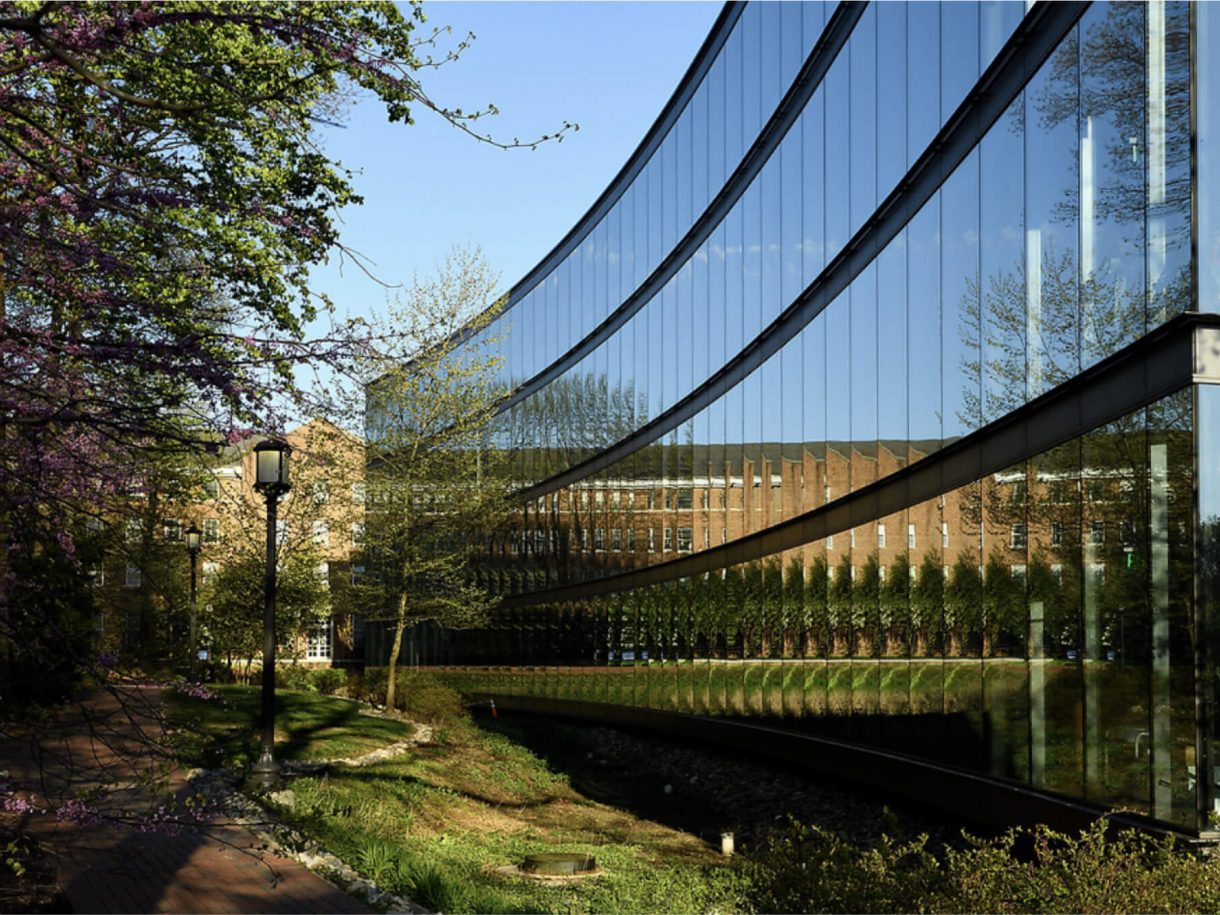
Reducing Emissions and Building Resiliency
In 2007, the President’s Task Force on Climate Change was formed to develop a set of recommendations for reducing greenhouse gas (GHG) emissions at Johns Hopkins University. At that time, students, faculty, staff and regional partners strategized pathways to address climate change mitigation, culminating in a 51% GHG emissions reduction goal by 2025. Since then, JHU has invested considerably in its infrastructure and buildings to utilize technologies that reduce emissions and increase energy efficiency. These initiatives have resulted in a steady decrease in the university’s carbon footprint, but more accelerated action is needed.
In the 2024 Climate Action and Sustainability Plan, JHU now commits to a target of net zero greenhouse gas emissions by 2040, with a series of interim targets
along the way, to drastically reduce our carbon footprint in advance of regional targets in Maryland, D.C., and Baltimore City. We also commit to enhancing our ability to anticipate and adapt to a changing climate through careful planning and collaboration with local and regional partners. The impacts of climate change are
already being felt and will increasingly challenge our health, operations, and infrastructure. Planning now will ensure the university is prepared for the long-term risks associated with climate change and the threats to our community and region.
 GOAL 3: Boldly Act to Reduce Greenhouse Gas Emissions
GOAL 3: Boldly Act to Reduce Greenhouse Gas Emissions
JHU aims to achieve net zero scope 1 and 2 greenhouse gas emissions by 2040, accelerate decarbonization and energy efficiency in existing buildings, and establish a scope 3 greenhouse gas emissions reduction initiative.
Johns Hopkins is home to some of the largest rooftop solar projects in the City of Baltimore. Photovoltaic panels sit atop seven buildings collecting solar radiation and converting it directly into electricity. These panels generate approximately 3,600 MWh of clean renewable energy each year—enough electricity to power approximately 200 U.S. households.
On Earth Day 2019, Johns Hopkins University announced a 15-year Solar Agreement with Constellation, an energy supplier headquartered in Baltimore, to procure 250,000 MWh of clean power annually. The agreement is the largest in the state of Maryland and was the largest among any single university nationally at the time of its signing. Along with demand-side energy management and efficiency investments across the university, the agreement helps JHU successfully meet its goal of reducing the university’s GHG emissions three years ahead of schedule, while also meeting international climate targets to limit global warming under 1.5°C.
In 2022, JHU became one of only 19 universities to join The Climate Registry, a nonprofit dedicated to connecting and empowering organizations to reduce GHG emissions to mitigate climate change. Now, JHU has received a Climate Registered Gold Certification, a designation for those whose emissions have been validated by a third-party and are reported publicly. Verification ensures that JHU’s GHG inventory aligns with global standards and that the university’s data is consistent and publicly transparent over time. This step provides assurance that JHU’s reported GHG emissions represent a faithful account of our climate impact.
Green Labs Program
The plan's key actions to reduce greenhouse gas emissions include expanding the JHU Green Labs program to engage researchers, reduce emissions, and improve resource efficiency in laboratory spaces.
Solar Dashboard
View the JHU Solar Dashboard to see how much energy on-campus solar panels are currently generating.
 Goal 4: Prepare Our Campuses and Communities for Future Climate Conditions
Goal 4: Prepare Our Campuses and Communities for Future Climate Conditions
To reach this goal, the university is working to integrate climate change impacts and adaptation strategies into campus plans and policies, as well as partnering to advance equitable climate adaptation in Baltimore and beyond.

Ralph O’Connor Sustainable Energy Institute
Based in Johns Hopkins University’s Whiting School of Engineering, the Ralph O’Connor Sustainable Energy Institute (ROSEI) is the university’s focal point for energy-related research and educational programs. Founded in 2021, ROSEI brings together the extensive energy-related activities already underway across the university and focuses on developing an impactful program to address the transformation of the energy sector to help address climate change.

Did You Know?
Buildings account for 97% of JHU’s energy consumption and greenhouse gas emissions. Learn more about how JHU is addressing sustainability in the Built Environment.





